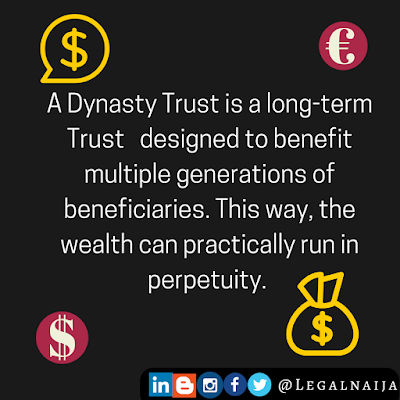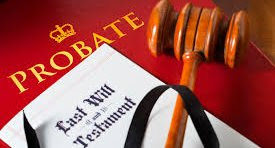
5 Emerging Trends in Estate Planning

Estate planning is a pertinent factor to take into consideration for the
disposition of an estate upon the death of the owner. Because of the
unpredictability of beneficiaries and estate laws across states, it is necessary
for each person to plan their estate so as to forestall any unwanted issues
relating to its disposition upon their death. These trends will be discussed
below.
disposition of an estate upon the death of the owner. Because of the
unpredictability of beneficiaries and estate laws across states, it is necessary
for each person to plan their estate so as to forestall any unwanted issues
relating to its disposition upon their death. These trends will be discussed
below.
General Note: nobody can say with
certainty when they will die. You can just walk out of your house to go to the
gym and a car will knock you down, thus ending your life. Or you can die in
your sleep. This list is endless. So, because of the unpredictability of the
human condition, everyone needs to create estate plans to secure their estate.
These means are listed below.
certainty when they will die. You can just walk out of your house to go to the
gym and a car will knock you down, thus ending your life. Or you can die in
your sleep. This list is endless. So, because of the unpredictability of the
human condition, everyone needs to create estate plans to secure their estate.
These means are listed below.
Create a Lifetime Gift
Estate holders can easily create lifetime gifts of material possessions
and landed properties to their intended beneficiaries to enjoy same before
their death. Once done, these gifts will not be subject to probate and its
accompanying estate taxes since the title in the properties involved had
already passed to its intended beneficiaries and so does not form part of the
estate to admitted into probate for disposition and federal taxing purposes.
And you will also have the satisfaction that you passed on a particular gift to
the person you want to pass it on to and they can even enjoy it while you are
still alive.
and landed properties to their intended beneficiaries to enjoy same before
their death. Once done, these gifts will not be subject to probate and its
accompanying estate taxes since the title in the properties involved had
already passed to its intended beneficiaries and so does not form part of the
estate to admitted into probate for disposition and federal taxing purposes.
And you will also have the satisfaction that you passed on a particular gift to
the person you want to pass it on to and they can even enjoy it while you are
still alive.
Create a plan for your Digital Assets (if you have one)
Holders of “Digital Assets” now create a plan for it. Currently, assets
exist both in the physical and digital sphere. Bitcoin wallets (alongside other
emerging cryptocurrencies), e-money wallets, online stock accounts,
money-making blog and website accounts with their corresponding payment systems
and passwords, Paypal accounts, Skrill and Neteller accounts, are simply some
out of the huge species of Digital Assets that float around on the Internet.
And these can be potentially worth thousands-if not millions-of dollars. In planning estates, holders of such
assets can create a document which harmonizes the details of all these
accounts in one place and then possibly put such document under the care of a
trusted attorney so that potential beneficiaries can access them when the need
arises.
exist both in the physical and digital sphere. Bitcoin wallets (alongside other
emerging cryptocurrencies), e-money wallets, online stock accounts,
money-making blog and website accounts with their corresponding payment systems
and passwords, Paypal accounts, Skrill and Neteller accounts, are simply some
out of the huge species of Digital Assets that float around on the Internet.
And these can be potentially worth thousands-if not millions-of dollars. In planning estates, holders of such
assets can create a document which harmonizes the details of all these
accounts in one place and then possibly put such document under the care of a
trusted attorney so that potential beneficiaries can access them when the need
arises.
Create
Letters of Instruction
Letters of Instruction
Although
estates originally involved the creation of wills and the inclusion of every
conceivable item to be handled as it pertains to a person’s estate, a new
current mode is fast encroaching on wills. Clients can now create letters of
instruction and leave them with their attorneys. This simplifies inheritance
instructions more easily as estate holders can use this to outline the mode the
person to dispose of their property will have to follow, put together a list of
all assets (whether tangible or intangible), and possibly add in any detail and
instructions he wishes for the executioners to follow in managing the estate.
Holders can even include personal messages to friends and family.
estates originally involved the creation of wills and the inclusion of every
conceivable item to be handled as it pertains to a person’s estate, a new
current mode is fast encroaching on wills. Clients can now create letters of
instruction and leave them with their attorneys. This simplifies inheritance
instructions more easily as estate holders can use this to outline the mode the
person to dispose of their property will have to follow, put together a list of
all assets (whether tangible or intangible), and possibly add in any detail and
instructions he wishes for the executioners to follow in managing the estate.
Holders can even include personal messages to friends and family.
Create
an Estate Dynasty Trust
an Estate Dynasty Trust
Estate
dynasty trusts is another way of easily securing an estate. This can be created
in order to pass wealth from generation to generation without incurring
transfers taxes like gift and estate tax. This can potentially last for more
than a hundred years. Usually, it is rich people who have a lot of assets that
plan their estate in this way to protect their accumulated wealth from being
used wastefully by wasteful dependents.
dynasty trusts is another way of easily securing an estate. This can be created
in order to pass wealth from generation to generation without incurring
transfers taxes like gift and estate tax. This can potentially last for more
than a hundred years. Usually, it is rich people who have a lot of assets that
plan their estate in this way to protect their accumulated wealth from being
used wastefully by wasteful dependents.
Estate
planning serves as a means for people to hand down their legacies to their
beneficiaries and also to possibly cut down the costs of estate taxes on their
estate. Taking note of emerging trends and regulatory changes aids in
accomplishing such an objective. Plus, you will be content that should anything
happen to you, your assets are protected and will be used in the way you want
them to be used.
planning serves as a means for people to hand down their legacies to their
beneficiaries and also to possibly cut down the costs of estate taxes on their
estate. Taking note of emerging trends and regulatory changes aids in
accomplishing such an objective. Plus, you will be content that should anything
happen to you, your assets are protected and will be used in the way you want
them to be used.
About
the author:
the author:
Kingsley
Ugochukwu Ani is a corporate attorney with particular interest in Reals Estate,
IT & IP law. He is also a writer and business development strategist. He
can be reached on aniugochukwu@gmail.com
and +2347035074930
Ugochukwu Ani is a corporate attorney with particular interest in Reals Estate,
IT & IP law. He is also a writer and business development strategist. He
can be reached on aniugochukwu@gmail.com
and +2347035074930







